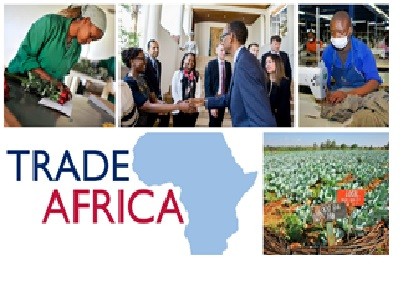Speeches Shim

OVERVIEW
The East Africa Trade and Investment Hub (the Hub) is the U.S. Government’s flagship project under the presidential Trade Africa initiative, launched in 2013 to boost trade and investment with and within Africa. The Hub partners with East African and U.S. businesses to attract investment needed to transform the East African private sector into vibrant global trading partners. Improving the region’s trade competitiveness, encouraging the diversification of exports beyond natural resources, and promoting broader, more-inclusive economic growth will lead to more food secure and resilient East African communities.
FOCUS AREAS
The goals of the Hub are to deepen regional integration, increase the competitiveness of select regional agricultural value chains, promote two-way trade with the U.S. under the African Growth and Opportunity Act (AGOA) and facilitate investment and technology to drive trade growth intra-regionally and to global markets.
The project achieves these ends by working with the private sector and local governments to find practical solutions for trade and investment constraints that lead to a pro-investment environment. It also builds awareness of opportunities for African and U.S. firms to increase trade, expand business partnerships, and invest in East Africa.
In support of the U.S. Government’s global hunger and food security initiative, Feed the Future, the Hub looks to increase access, availability and utilization of East African-grown staple foods in the region. It supports regional initiatives that improve market information, increase access to inputs, and reduce non-tariff barriers that can hinder trade across borders.
The Hub utilizes the capabilities and networks of multiple U.S. government agencies, regional trade associations, and development partners to extend the adoption of regional initiatives.
PROJECT IMPACT
Malagasy Companies Regain Footing in U.S. Markets In October 2015, Malagasy craft company Kaloes shipped its first U.S. order of $48,000 worth of raffia handbags to a company based in Texas. Soon after, Kaloes secured its second U.S. order, this time, for $120,000 worth of raffia product.
Raffia is indigenous to Madagascar and features prominently in the crafts and home décor products from the eastern African island nation. Raffia meets the U.S. consumer demand trend for more natural, sustainable fibers. It can function as a textile, used to weave durable mats and baskets, or, it can also be used to weave striking handbags, as in the case of Kaloes.
Kaloes Owner and Founder Jean-Marie Parthenay met his Texas buyer at the August 2015 Sourcing at Magic Trade Show in Las Vegas, Nevada. The Hub sponsored his attendance and supported him during the show.
It was Parthenay’s first U.S. tradeshow experience. He was relieved to have the Hub’s technical advisors help him make connections with buyers and navigate the technicalities of exporting to the U.S.
“It was the first time in 15 years that I met a company that was proud to say ‘made in Madagascar’,” said Parthenay. “They asked me to develop a collection.”
The Madagascar Ministry of Industry estimates that export companies, like Kaloes, have supported the creation of more than 26,000 jobs since AGOA’s reinstatement.
Kaloes employs more than 200 people and produces 25,000 tote bags, hats, and accessories a month. Each piece blends Malagasy and Western techniques for a signature look that appeals to U.S. importers and fetches a higher price tag than if Kaloes were to sell the same product domestically.

Comment
Make a general inquiry or suggest an improvement.